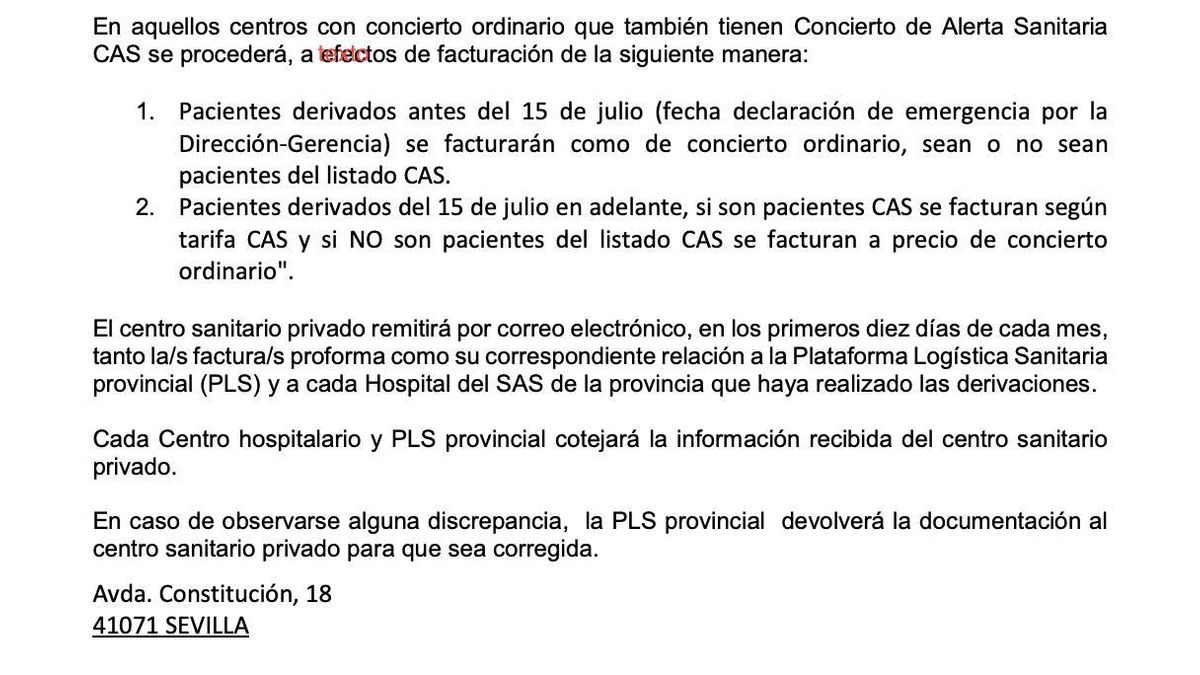The Judge of Instruction number 13 of Seville, José Antonio Gómez, is investigating the exchange of emails between the Andalusian Health Service (SAS) and the private clinics that, between 2020 and 2024, benefited from emergency contracts (finger) for more than 234 million euros, laying in the legal framework enabled during the pandemic when it was already repealed.
The judicial instruction, where the Anti -Corruption Prosecutor's Office and the PSOE are also personada as a popular accusation, splashes the government of Juan Manuel Moreno for an alleged crime of prevarication, although the complaint of the Socialists includes other criminal cases, such as embezzlement of funds and documentary falsehood. The current SAS manager, Valle García, and his two predecessors in office, Miguel Ángel Guzmán and Diego Vargas is charged.
The emails that act in the hands of the judge and the prosecutor-to which this newspaper has had access-reveals the alleged indications that SAS gave to private clinics so that they “leave in suspense” the public concert they had awarded when the Covid-19 Pandemics broke out, in March 2020, “to continue carrying out” the same operations and evidence committed to “an emergency contract”.
The concert they had signed with the SAS for the derivation of patients on the waiting list was an ordinary contract, and with negotiated public prices. On the other hand, the emergency contract signed by these same companies was awarded by finger, without advertising or competitive concurrence, and with generally more expensive rates, because they are born from an “urgent and unforeseen necessity.”
When the pandemic explodes, at the beginning of 2020, the SAS had signed ordinary active concerts with hospitals and private clinics, but within a few months it begins to award contracts by finger to those same companies to continue carrying out the same operations at a higher price.
Among the extensive documentation that the Ministry of Health sent to the judge, in a first wave, an email appears that illustrates this procedure. It is dated May 9, 2021 and is directed by the CEO of the Granada Diagnostic Center, a clinic that had signed a public concert with the Andalusian Board to make resonances to the SAS hospitals in the province.
The message is aimed at the Subdirectorate of Accessibility and Continuity of Assistance and says: “We have received your contract to sign, but we need to tell you that we think there may be a problem with the amount of the award set at 150,000 euros.”
And he continues: “We understand that the provincial contract (according to conversations with Teresa Gasso) (Economic Director of the Purchasing Central of Granada) that we have awarded to carry out magnetic resonance studies, we would leave it in suspense until December 31 to be able to continue carrying out these studies under a framework of the emergency contract that refer us to us in their mail and we need Granada hospitals until the end of the year. ”
The employer ends up asking the SAS to assess the maximum amount of the emergency contract before signing from our side or clarifying whether the provincial contract is reactivated once the 150,000 euros of this contract is consumed. ” This newspaper has asked the Ministry of Health on this matter, which has eluded answering the questions claiming that the case is judicialized.
Same service, different price
The SAS unified the prices of interventions and evidence in emergency contracts during the pandemic, but in many cases they remained more expensive than by public tender. For example, for the tests performed by the Granada Diagnostic Center, a nuclear resonance cost 81 euros for ordinary concert and increased to 115 euros per emergency. The price of an ultrasound was 18 euros in the first case and rose to 28 euros in the second.
Another of the emails investigated by the judge is dated June 2, 2021, and is referred to the territorial managing director of Andalusia of the Quirónsalud Hospital Sacred Heart, Pilar Serrano Moya, to the Sub -Directorate of Accessibility and Assistance Continuity of the SAS. “As you informed us in the new emergency contract of the year 110/2021, the Quirónsalud Campo de Gibraltar hospital has an allocation of 2,000,000 euros and we currently have billed the amount of 1,721,178, having consumed 80% budget allocation.”
And he adds: “The hospital has a ordinary concert with a loan of 1,243,000 euros, but you informed us that we had to give up to host the emergency contract. Please, tell me how we proceed to increase the current credit. A hug.” The Department of Health has avoided explaining why clinics were urged to “give up” the concert they had signed to “take” a finger adjudication, and if that change was an extra cost for public coffers.
These emails are part of the documentation that SAS sent to the judge investigating healthcare contracts shortly after opening proceedings, but the PSOE, which also has access to the instruction as a person person, again included them in some allegations sent the court last week to broader the framework of the investigation.
SAS authorizes double billing
The document, advanced by the SER chain and to which Eldiario.es has had access, collects and orders the “dispersed documentation” that the Board sent to the judge, and denounces “new criminal indications found” in emails, bills and loose files.
The socialists admit that the “finding” of these email has been “random”, so they ask the magistrate to claim the SAS the complete files of each contract under suspicion, including emails and all communications between those responsible for purchases and the private clinics that have benefited.
To this day, the Moreno Executive has justified the extensions and extensions of budgets in emergency contracts with private health until May 2023, shortly after Eldiario.es made public the unfavorable reports of the intervention of the SAS questioning the validity and legality of this type of contracts two and a half years after the pandemic.
Audits in emergency hiring in 2021, 2022 and 2023 agree that the Board “would be using the emergency procedure as something different from the provisions of the Public Sector Contract Law itself (absolutely acceptional and limited character to what is strictly necessary to remedy the event produced or for the satisfaction of the Neceisaded Survey)”, the aforementioned reports coincide.
Two weeks ago, the judge agreed to the last request of the PSOE and requested SAS for an enormous amount of documentation, also requiring to be chronologically sent in an orderly manner. The PSOE, in his letter, insists again so that the magistrate requests “Judicial Aid of the General State Intervention” to help him to collect and describe all that documentation.
The private clinics of Andalusia that, in the pandemic root, passed from the public concert signed with the SAS to the emergency contract for the same services at higher prices cling to instructions to this which issued the Board, in August 2020, for those who combined the two hiring procedures.

These instructions from the SAS Management Directorate, revealed by this newspaper, were sent by email to all private health centers that benefited from the double simultaneous hiring, that is, “Centers with ordinary concert that also have CAS (emergency) health alert concert”, giving them specific indications to invoice in two different ways the same operations and the same tests.
The document collects that double turnover, with rates for derived patients “before July 15” – when SAS approves the first emergency statement – and other rates (usually more expensive) for derived patients after that date. The first “will be billed as a ordinary concert, whether or not they are patients with the CAS list (derived by emergency contract)” and the latter, “if they are CAS patients, they are billed according to Tariff Of accessibility and healthcare continuity, the same department to which companies were directed by email to confirm that they had to “suspend their ordinary contracts” to “continue carrying out” the same operations under an emergency contract.
The coexistence of both procedures at the beginning of the pandemic made, for a while, the SAS were paying some clinics more than others to perform the same tests and operations. This caused protests from private companies that had their ordinary concerts in force and, therefore, continued to operate patients derived from public health at public prices concerted before the pandemic, cheaper than the rates set later for health alert contracts.
The SAS Managing Directorate then sent those instructions to private clinics and hospitals with emergency contracts, including those that also maintained in force with the Board. The guideline was to charge operations and tests with patients with emergency hiring rates (that is, the most expensive) from July 15 onwards.
SAS Sources have recognized this newspaper that “the same surgical intervention was paid with a different rate”, because there were private health centers that still had “idle capacity” after the pandemic, and through emergency hiring could assume more patients than they had assigned by ordinary concert. “Ordinary concerts managed and paid the provincial hiring platforms of the SAS, while the emergency contract was paid from the central services of the SAS, even if there was a first filter from each platform,” explain these sources.
The instructions on billing sought, therefore, “differentiating interventions from patients with ordinary contract from those who were not covered by that concert.” Health does not clarify whether these guidelines were in force beyond December 31, 2020. The emails between the SAS and the companies that reveal alleged indications of the Board so that the clinics with a public concert renounce them to take advantage of an emergency contract are dated almost a year after those instructions are issued.





